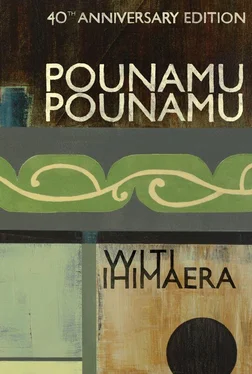‘E noho ra,’ Dad whispers again. He starts the car.
The people wave as we depart. The car gathers speed. Mum sobs loudly. Dad is crying too. They look back.
The houses are getting smaller. We pass Rongopai. All the waving people become little flags fluttering far away. We turn onto the road. We leave Waituhi behind.
I look ahead. The road leads to Wellington, the big city. Emerald City!
Hey! I should be happy!
But I’m not, you know. I thought going away was supposed to be happy.
It is happy, isn’t it?
I am happy, aren’t I?
I look back.
We have been living in Waituhi all our lives, and that house disappearing was our house, and those people were our people, and we had green paddocks and Emere was our cow and …
E noho ra, Emere.
Stay away, tears.
IN SEARCH OF THE EMERALD CITY
At the time I was a boy, the great rural to urban migration of Maori was happening, from 1945 through to the 1970s. Maori were leaving their wa kainga for jobs in cities. Clearly, a people without a land base has no economic livelihood. Although my family, for instance, were now living in Gisborne, my father was still working as a member of the Smiler shearing gang, or sometimes for Robbie Cooper as shearer and labourer. The trouble was that the work was seasonal, so a lot of people had to be laid off during the winter.
Cities offered the prospect of more variety of work in factories, better pay and better education opportunities for children. I guess it was inevitable, therefore, that every year more families left Waituhi, mainly to live in Gisborne where the freezing works and Wattie’s canning factory were. Some families migrated even further away, to Wellington or Auckland, and I could not help but notice that every year more and more houses in my beloved Waituhi were lying empty.
What set this particular story off was watching my grandmother, Teria, saying goodbye to one of her sons, either Uncle Mike or Uncle Win or maybe it was Uncle Mafeking. Sometimes a moment — in this case, my beautiful grandmother trying to be brave, not breaking down, and merely tracing the cheeks of her son with her fingers — is enough to create a huge sense of emotional loss, and I was witnessing such a moment. I wanted to capture that and, in particular, the eagerness of a young boy whose family is all packed up and ready to go.
I’ve used, in the title, imagery from Frank Baum’s The Wizard of Oz. Later, I wrote other stories of that same boy in ‘Yellow Brick Road’, ‘Return to Oz’ and ‘Kansas’. I like to think of this story — indeed, all the stories in Pounamu Pounamu — as my Songs of Innocence. In subsequent books, I expanded my work by writing my Songs of Experience, narratives of race relationships and the hugely difficult times for Maori as they traversed the Pakeha world and engaged with it, not only in urban areas but, ironically, also on their own turf.
1
His room is a small one. Four walls, a large wardrobe inset with a full-length mirror, a little desk littered with his schoolbooks, a bookcase, a single bed spread with a quilt his mother has made, and a chair with a clock on it. The alarm is set for half past five in the morning. In four minutes it will ring.
The boy is still asleep. The blankets are drawn around his neck so that no air can get in to disturb the warmth. His head is burrowed beneath the pillow and there is just a small opening for him to breathe through. He sleeps covered like this because last night was very cold. Also because now that it is summer, the sun slants earlier through his bedroom window and would shine full on his face if it were uncovered. Then he would wake up before he needed to, and half past five is early enough to have to wake up as it is.
But the morning draws relentlessly on. The sun pierces through the foliage of the lemon tree outside the boy’s window and makes the shadows of the branches and leaves leap and shiver and grow within the room. It lights up a pile of school clothes on the floor: cap, unpolished shoes, shorts, grey shirt and long socks. Then it pauses for a moment on the pencil marks on the wallpaper as if trying to rub them out. But they are indelible. A record, made by the boy, of how tall he has grown in the last five years. The topmost pencil line is very thick and almost cries out the boy’s despair at not having grown at all in the last few months. Obstinately it registers and insists that he is still five foot two and a quarter inches tall. No more, no less. He can comb his hair higher if he wants to or put on his thickest soled shoes, but he will still be only five foot two and a quarter inches tall and he may as well get used to it. Anyway, that’s tall enough for a thirteen-year-old boy isn’t it? The sun moves away but pauses again at an opened exercise book. English composition: a story about pirates, in large writing so that the page has been filled with the minimum of effort and imagination. On the opposite page, the previous week’s story has been commented on by the boy’s teacher: ‘Bears no relation to the subject set. No marks.’ As if embarrassed, the sun moves away, across the bed where the boy huddles. The hands of the clock tick tock, and then the shrill bell rings to rupture the boy from his dreams.
‘Go on then, you damn clock!’ the boy thinks beneath the pillows. ‘Ring until you’re all rung out and see if I care. You’re just fooling me, I know your tricks. Well I’m not budging. I’m not moving. It’s not time yet. And anyway, it’s too cold.’
The boy waits for the clock to stop but it grinds obstinately onward, a long incessant yell at him to wake up. He pretends not to hear, and finally the alarm begins to wind down, gives a few gurgles and bleats, and gives up. The boy is exultant, but then he hears three loud thumps on the wall and his father’s voice grumbling and loud, calling to him.
‘Hema! Hema, stop that clock.’
‘It’s off now, Dad!’ the boy yells back, pulling the pillow away from his head. He listens, alert, as his father settles back to sleep again. Then he slides his head back under the pillow.
But the clock cries for vengeance. It seems to the boy that it is ticking and tocking more loudly: you must get up, you must get up, there is work to do, there is work to do.
The boy mutters to himself. But the clock has won as it always does and ticks with satisfaction at the sight of one small arm creeping out from beneath the blankets to grope for and finger the old clothes lying on the floor. The hand picks up a singlet and underpants and ferries them beneath the blankets. The bed arches and squeaks in tumult and then subsides. The hand appears again. This time, a shirt disappears. Trousers are the next to go, followed by a thick jersey and socks. Each time, mutterings and cursings issue in muffled despair from the bed, and minor earthquakes heave. Finally, the tumult subsides. For a moment, there is silence. And then a cautious foot slides slowly out of the bed, the toes twitch, testing the temperature, point down like a divining rod searching for water, delicately touch the floor, rebound with the shock, touch the floor again and resignedly teeter there like a ballerina’s foot before lowering from toes to sole to heel. The other foot follows. And then the boy rises, still swathed by the blankets which now also cover his head, to sit there like a patchwork-quilted ghost.
Another day has begun. And like a beetle shuffling out of its protective cocoon, the blankets peel away and the boy appears.
With a groan, Hema lurches out of bed. He greets the morning with a yawn. Sleepily, he blunders down the passageway, thinking enviously of his two sisters who are still in bed.
Читать дальше












